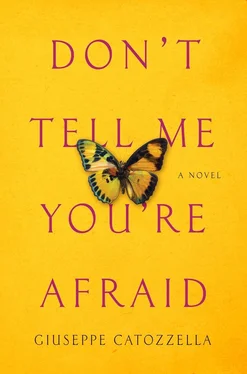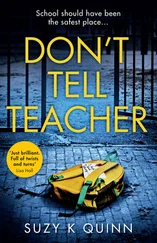They were everything I might never be able to be. I remained a tahrib, running alone.
But in truth there was only one thing I wanted, and that was to win.
Little by little during those months, without even being aware of it, I began to entertain the desire to leave that place as well. I realized that occasionally, talking with Amina and Yenee, I would speak about Addis Ababa and our house as if they were already part of the past, as though I felt the need to start preserving their memory. Even though I was there.
I lived the last few months in a kind of melancholy countdown toward the future. The more I began to feel uncertain about what was to come, the more I tried to stamp those places and sensations in my memory. As in Mogadishu six months earlier. I had a premonition that those memories would accompany me on a Journey that I couldn’t decide to face but that I increasingly felt was crucial.
I said things like “Someday I’m going to miss your cooking and all the commotion you make before you go to bed.” They looked at me and didn’t understand. They thought I was homesick for my house and for Hooyo and that that was why I was sad every now and then.
Though I realized it only later, the truth is that those six months flew by and gave breath to the desire to leave behind the condition of tahrib for good.
Slowly, day by day, the desire to join Hodan in Finland took shape, the urge to find a competent coach in a place where I wasn’t an illegal and could do everything like a normal person, like any other girl.
More than anything else I wanted to feel normal, ordinary. I had to leave there. It was the only way to qualify for the London Olympics and try to win them. I understood that now.
At ten o’clock one morning, after planning everything in secret, without saying a word to anyone, not even to Eshetu or to Amina and Yenee, I tossed my few belongings in my bag and left.
On the table I left the money for the week’s rent and a note: Dear Yenee and Amina, I’ll miss you. Good luck, Samia.
I left on foot, alone. In my pocket, the money I’d earned working during those six months.
Like Hodan, I would get to Europe.
I would face the Journey.
It was July 15, 2011. I had just turned twenty and still had one more year to qualify for the Olympics.
I would make it, there was no doubt.
In a short time I’d be gone from there.
Safe at last.
Safe.

KNOWING WHERE TO FIND the human traffickers was easy. All the Somalis in Addis Ababa knew it, and in recent weeks I had asked the right questions. Sooner or later every Somali living in Ethiopia would turn to them in order to get to Sudan. And from there to Libya. And then finally to Italy.
It wasn’t difficult to track down Asnake.
As a cover, Asnake worked at the Addis Ababa market. I would have to pay the equivalent of seven hundred American dollars in reali, the Ethiopian currency. He or one of his friends would take me to Khartoum, in Sudan. I didn’t have much more money, but I had no choice, and I didn’t want to wait any longer. So I went to Asnake and he told me to be patient, that I couldn’t leave right away; they would let me know when my day came.
I waited those last ten days trying to stay calm and not let on to Amina and Yenee; I didn’t want any questions; I didn’t want to explain myself.
Then one morning around ten o’clock Asnake sent a boy to the house to summon me.
We would leave three hours later. The first time I’d met Asnake he had warned me that I would have no time to prepare, that when the time came, it came, and I would have to leave immediately. But I really didn’t need to prepare; I had been waiting for that moment for days now.
So I tossed my few belongings in my bag, rewound Hooyo’s handkerchief with the shell around my wrist, took a bottle of water, left a note for Amina and Yenee, and left.
As I resolutely performed those small acts, I had no idea what I was committing myself to.
The meeting place was a garage that was used to store motorcycles or bicycles. When I arrived, almost everyone was already there waiting. All together there were a lot of us; I had always thought it would be just me, or at least just a few of us. Instead I counted seventy-two of us.
We were left there for an hour, not knowing what to do, inside that garage with the rolling shutter pulled down. Crammed into a tiny space. With each passing minute I wondered what would happen. I hugged the bag tightly under my arm. It was my past, my history: Right away I felt the need to make contact with something familiar, a memory. Surrounded by so many people you’re likely to lose yourself, to give up; I realized that right away. There were mothers with children, a lot of women, and even some elderly people. The acrid smell of gasoline and burned oil quickly tainted what little oxygen there was; in addition, the sweating bodies soon gave off a nauseating odor. We were close together, packed so tightly that the skin of our arms touched. Under the veils we were drenched; the men had drops of perspiration on their faces. And so we waited. No one knew exactly for what.
After an hour the children began crying. That senseless waiting was getting on our nerves. We would have to wait longer. After another hour the shutter was rolled up and a Land Rover arrived with six men.
When I realized that all seventy-two of us were expected to crowd into the open bed of the jeep, my legs buckled and I had to grab hold of the woman standing beside me. Some of the others were desperate; a few seemed to know it all.
With no time to think, we were ordered to pile everything we had in a corner. Everything. They would see to our bags later. Each of us was allowed only one small plastic bag. One of the traffickers distributed them. Nobody wanted to be separated from his baggage: Inside was all that remained of our lives. Like premature butterflies, we didn’t want to leave our cocoons. I thought about the headband, the newspaper clipping; I touched the shell at my wrist. Then, like a lightbulb going off, came the thought of returning, running back to the house, tearing up the note on the table and acting like nothing had happened. Sooner or later the documents would come; I just had to hang on.
The traffickers came forward to seize the bags of those up ahead who didn’t want to let go of them. A few people tried to protest; the answer was that if they didn’t like it, they could stay there.
Did I really want to stay in Addis Ababa? For how long? My whole life? For how long would I have to run by moonlight, like a cockroach? I opened my bag and took out Aabe’s headband, the photo of Mo Farah, a qamar, and a garbasar, and I left all the rest in the corner.
Immediately my bag was buried under a thousand others.
In silence the six men set out two benches in the center of the jeep’s bed, so as to form four rows of seats. It seemed impossible that we could all squeeze in. But slowly, with a surgical precision that suggested the skill of certain craftsmen, they fit us in like pieces of a puzzle.
We had to keep our knees open to make room for a stranger’s leg between them.
I was so wedged in that I was barely able to breathe. Again I had the urge to get out of there. Then a baby started wailing in my ear, and I came to my senses.
I tried to remember why I was there. I had to keep going.
The trip was to last three days; it was critical that we bring nothing with us but the plastic bag: The jeep would be our living space for seventy-two hours, they told us. We couldn’t even bring water. They had jerricans for all of us.
Читать дальше





![Ally Carter - [Gallagher Girls 01] I'd Tell You I Love You But Then I'd Have to Kill You](/books/262179/ally-carter-gallagher-girls-01-i-d-tell-you-i-lo-thumb.webp)







